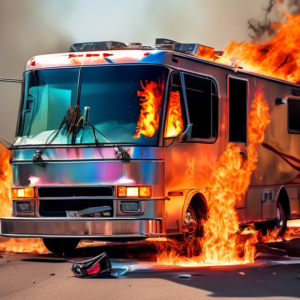Shocking Footage Shows Rapid Engulfment of RV
In a terrifying incident caught on a motorcyclist’s helmet camera, an RV was completely destroyed by a raging fire. The footage, which has since gone viral, serves as a stark reminder of the importance of fire safety measures and the speed at which such disasters can unfold.
The Incident: A Routine Ride Turns into a Nightmare
The incident occurred on a seemingly ordinary day on [Highway/Road name, Location]. A motorcyclist, [Name of the motorcyclist, if available and permissible to share], was cruising along the highway, helmet camera recording, when he noticed plumes of smoke billowing from a distance. As he got closer, the source of the smoke came into horrifying focus: an RV engulfed in flames.
The helmet camera footage captures the intense scene. Flames are seen shooting out from the RV’s windows, and thick, black smoke obscures the sky. The motorcyclist, clearly shaken by the sight, pulls over to a safe distance. Other motorists are seen doing the same, the highway coming to a standstill as the inferno rages.
Emergency Response and Aftermath
Emergency services were immediately contacted, and firefighters arrived promptly at the scene. Battling the intense heat and flames, the firefighters worked tirelessly to contain the fire and prevent it from spreading. Despite their best efforts, the RV was completely destroyed, reduced to a smoldering wreck.
[Information about the occupants of the RV, if any, and their condition. If no information is available, mention that the authorities are investigating the cause of the fire and whether there were any casualties.]
A Stark Reminder: The Importance of RV Fire Safety
This terrifying incident underscores the crucial importance of fire safety measures, particularly when operating or residing in a recreational vehicle. RVs, by their very nature, pose unique fire risks due to their compact living spaces, flammable materials, and potential for electrical and gas-related issues.
Essential RV Fire Safety Tips Every RVer Should Know
1. Fire Extinguishers: Your First Line of Defense
Having the correct type and number of fire extinguishers is non-negotiable. Ensure you have at least two fire extinguishers: one easily accessible from the living area and another in the kitchen. Familiarize yourself with the different fire classes (A, B, C) and ensure your extinguishers are rated for multiple types of fires common in RVs.
2. Smoke and Carbon Monoxide Detectors: Early Warning Systems
Regularly inspect and test your smoke and carbon monoxide detectors to ensure they are functioning correctly. These devices are lifesavers, providing early warnings in case of fire or dangerous carbon monoxide buildup.
3. Propane Safety: Handling with Care
Propane, commonly used for cooking and heating in RVs, is highly flammable. Regularly inspect propane lines, connections, and appliances for leaks. Turn off the propane supply when not in use, and always store propane cylinders in a well-ventilated area away from heat sources.
4. Electrical Systems: Prevent Electrical Fires
Overloaded electrical circuits are a common cause of RV fires. Be mindful of the electrical load capacity of your RV and avoid using multiple high-wattage appliances simultaneously. Regularly inspect electrical cords for damage, and replace them immediately if any are found.
5. Fire Escape Plan: Be Prepared
Develop and practice a fire escape plan with everyone traveling in your RV. Identify multiple exit points and ensure everyone knows how to quickly and safely evacuate the vehicle in case of a fire.
6. Regular Maintenance: Prevention is Key
Regular maintenance plays a vital role in preventing RV fires. This includes inspections by certified technicians, particularly of the electrical system, gas lines, and appliances.
7. Safe Cooking Practices: Stay Vigilant
Never leave cooking unattended, especially when using open flames. Keep flammable materials away from the stovetop, and have a fire extinguisher readily accessible in the cooking area.
8. Careful Parking: Consider Surroundings
When parking your RV, be mindful of your surroundings. Park away from dry grass and vegetation, which can easily catch fire from engine heat or exhaust sparks.
9. Campfire Safety: Responsible Enjoyment
If building campfires, ensure they are permitted in the area and always follow fire safety regulations. Keep a safe distance between the campfire and your RV, and never leave a fire unattended.
10. Stay Informed: Ongoing Education
Stay updated on the latest RV fire safety recommendations and best practices. Information is readily available through RV safety organizations, fire departments, and online resources.
Conclusion
The shocking footage of the RV fire serves as a sobering reminder that fire safety should be a top priority for all RVers. By taking the necessary precautions, staying informed about potential risks, and practicing fire safety measures, you can help prevent tragedies and ensure a safe and enjoyable RVing experience.


